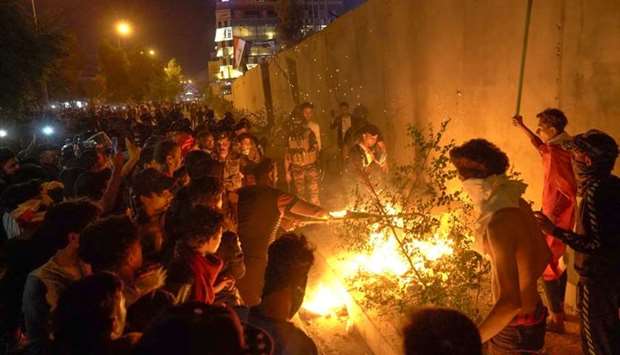Four protesters were shot dead early Monday outside the Iranian consulate in Iraq's holy city of Karbala where demonstrators vented their anger at what they see as Tehran's meddling in their country's politics.
The bloody unrest was part of a wave of ongoing protests, road blocks and a campaign of civil disobedience against the Iraqi government which the demonstrators accuse of rampant corruption and blame for poverty and unemployment.More than 270 people have lost their lives since the anti-government rallies broke out on October 1, according to an AFP count, but officials have stopped providing precise casualty numbers in recent days.
Late Sunday night, a crowd of protesters in Karbala gathered around the consulate of neighbouring Iran, which they accuse of propping up the very government they are trying to overthrow.
They tried to scale the blast walls, aimed fireworks at the building, hung Iraqi flags onto concrete fortifications and spray-painted "Karbala is free, Iran out, out!" on them.
As the crowd grew, heavy gunfire and volleys of tear gas rang out, and AFP correspondents witnessed protesters left motionless on the ground after suffering gunshot wounds.
"They're not firing up in the air. They intend to kill, not disperse," said one young protester wearing a medical mask to protect himself from the tear gas, about Iraqi forces guarding the mission.
"They're protecting the Iranian embassy while all we want is a country. Why are they killing their own countrymen for another country?"
The forensic medicine department later confirmed four protesters died after being shot.
Iraq has close but complicated ties with its eastern neighbour Iran, with whom it fought a deadly war in the 1980s but which now has significant political and economic sway in Iraq.
Tehran has sought to reduce the protests next door, with sources reporting top commander Qassem Soleimani making several visits to "advise" Iraqi authorities on coping with the rallies.
Iran's supreme leader Ayatollah Ali Khamenei has also slammed the protests in Iraq and Lebanon, labelling them conspiracies by the US and others.
Undeterred by the latest violence, protesters pushed on Monday with civil disobedience tactics they have increasingly adopted over the past week, including sit-ins, road closures and strikes.
The national teachers' syndicate was the first to impose a nationwide strike, shutting down schools across the country, and other trade unions later joined in.
Government offices in more than a half-dozen southern cities have been either stormed or closed for lack of staff, with demonstrators hanging banners reading "Closed by order of the people" atop the buildings.
Others have erected checkpoints to stop security forces or imposed curfews on officials and police, with roads cut in Samawa and protests in Nasiriyah and Hillah on Monday.
Protesters have also shut the highway to the Umm Qasr port, one of the main conduits for food, medicine and other imports into Iraq.
In Amara, sit-ins were underway Monday at the Halfaya and Buzurgan oil fields, blocking employees from accessing the site but not interrupting production, according to AFP.
The spreading non-violent actions defied a plea the previous evening by embattled premier Adel Abdel Mahdi for protesters to end their campaign.
"Now is the time for life to go back to normal," Abdel Mahdi, 77, said in a statement, one of the few times he has addressed protesters over the last month.
He insisted that many of their demands "have already been satisfied".
Abdel Mahdi has announced hiring drives and increased social welfare, while President Barham Saleh has proposed early elections after a new voting law is agreed.
But protesters have demanded an overhaul of the entrenched political class and deep-rooted change to end rampant corruption and clientelism that they charge is holding the country back.
Despite being OPEC's second-largest crude producer, one in five Iraqis live below the poverty line and youth unemployment stands at 25 percent.
Abdel Mahdi came to power a year ago through a tenuous partnership between populist cleric Moqtada Sadr and paramilitary leader Hadi al-Ameri.
The kingmakers' alliance has frayed in recent months, as Sadr threw his weight behind the protests while Ameri and his allies backed the government.
A rapprochement built on Abdel Mahdi's ouster appeared close this week, but disagreements over a replacement and pressure by Iran seem to have caused a stalemate.

